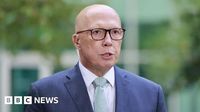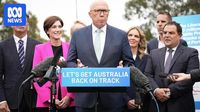In a significant reversal, Peter Dutton, the leader of Australia’s opposition Liberal Party, admitted on Monday that his party’s controversial proposals to end remote work arrangements for public servants and to cut tens of thousands of government jobs were a "mistake." This admission comes as the party faces declining support in the lead-up to the federal election scheduled for May 3, 2025.
Dutton, who previously promised to mandate that government employees work from the office five days a week, acknowledged the backlash against the policy, particularly from women and families who would be disproportionately affected. "I think it’s important that we say that and recognise it, and our intention was to make sure that where taxpayers are working hard and their money is being spent to pay wages, that it’s being spent efficiently," he stated in an interview with Channel Nine.
Despite this about-face, Dutton’s opponent, Prime Minister Anthony Albanese, was quick to cast doubt on the sincerity of the Liberal leader’s change of heart. Albanese remarked, "Peter Dutton wants to undermine work rights and, in particular, doesn’t understand modern families, doesn’t understand the important role that women and men play in organising their families." This tension highlights the broader struggle between the two parties as they grapple with critical issues such as work flexibility and economic management.
As the election approaches, opinion polls indicate a tight race, with the latest Newspoll showing Labor leading the Coalition 52-48 in a head-to-head matchup, a slight increase for Labor from the previous poll. This shift reflects growing concerns among voters about cost-of-living issues, particularly a severe housing affordability crisis that has dominated the campaign narrative.
In addition to the work-from-home policy, Dutton’s initial plan included cutting 41,000 public service jobs, a move intended to improve efficiency within the public sector. However, in light of public outcry, the Coalition has now clarified that any job reductions would be pursued over five years through a hiring freeze and natural attrition, rather than forced redundancies.
Shadow Finance Minister Jane Hume emphasized that the party had "listened" to the community’s concerns regarding flexible work arrangements and would not be pursuing drastic changes. "We have understood that flexible work, including work from home, is part of getting the best out of any workforce," she stated.
Meanwhile, Employment Minister Murray Watt criticized Dutton’s shift, describing it as an attempt to perform a "face lift" on his political image. He argued that Dutton’s credibility was waning, stating, "Peter Dutton is in the process of giving himself the worst facelift in Australian history, trying to change who he is, he’s trying to change what he says." Watt’s comments reflect the broader skepticism within the Labor Party regarding Dutton’s ability to lead effectively.
As the election campaign heats up, discussions around housing affordability remain crucial. Shadow Housing Minister Michael Sukkar has proposed limiting new international student enrolments to 240,000 per year, arguing that this would help young Australians enter the property market. Sukkar pointed out that rents have surged by 18 percent under the current government, exacerbating the housing crisis.
In response to economic concerns, AMP’s deputy chief economist, Diana Mousina, noted that while there is a 20 percent risk of a recession in the next 12-18 months, Australia is not currently in a crisis. She emphasized that historical patterns show Australia often avoids recessions even during downturns in the United States.
On the economic front, Treasurer Jim Chalmers highlighted that Australia has the lowest energy inflation in the developed world, attributing this to the government’s efforts to manage the economy effectively. Chalmers expressed confidence that the Treasury does not expect Australia’s economy to regress, despite global uncertainties.
As the election date approaches, voters are reminded that the deadline for enrolling to vote is April 7, 2025, at 8 PM. This compulsory enrollment for all Australian citizens aged 18 and older underscores the importance of civic engagement in shaping the future of the country.
In a related development, the federal government announced a $100 million pledge for a new convention centre in the Australian Capital Territory, further indicating its commitment to infrastructure development amid the electoral campaign. Finance Minister Katy Gallagher stated that this initiative is a result of collaborative efforts between Labor governments to deliver for the ACT.
With the election looming, the political landscape remains fluid, and the strategies employed by both major parties will be closely scrutinized by the electorate. As Dutton’s Coalition seeks to regain ground in the polls, the effectiveness of their revised policies, particularly regarding work arrangements and economic management, will be pivotal in determining the outcome of the upcoming election.






